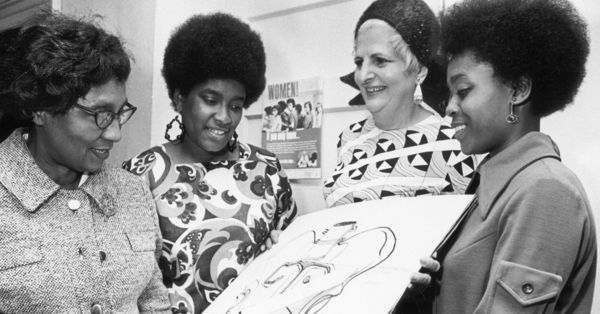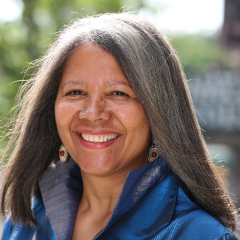
Helen O. Dickens, left, in 1975
Trailblazer. Heroine. Exemplar. These are just some of the descriptive names that can be applied to Helen O. Dickens, MD, who joined Penn’s department of Obstetrics and Gynecology in 1956 and was the first female black board-certified OB/GYN practitioner in Philadelphia. Among her other “firsts”: she was the first black woman to be named a Fellow of the American College of Surgeons and the first black woman to be elected to the American College of Obstetrics and Gynecology. In 1967, she established one of the first clinics for teens in the United States, focused on school-age mothers in Philadelphia. In 1998, three years before Dickens died, the clinic was renamed the Helen O. Dickens Center for Women’s Health. Another of her landmarks was being named the nation’s first associate dean for minority affairs at Penn’s medical school in 1968. She was also named a Distinguished Daughter of the Commonwealth by the governor of Pennsylvania and was awarded honorary degrees by both the University of Pennsylvania and the Medical College of Pennsylvania.
These are very noteworthy achievements, perhaps all the more impressive because Dickens had no advantages when growing up. Born in 1909, she was the daughter of a former slave. She entered college at age 17 and earned her medical degree from the University of Illinois in 1934, one of only two women in the class and one of the only three black students. In 1945, after completing additional training at Penn’s Graduate School of Medicine, Dickens was named director of the OB/GYN department at Philadelphia’s Mercy Douglass Hospital. Over her more than 50 years in medicine, she also fought against the double standards in health care that led to inadequate treatment for minorities. It is no wonder that the Helen O. Dickens Commemorative Lecture in Medicine, established in 2010 by Penn’s OB/GYN department, is described as “celebrating the role of pioneering women in medicine.” As one of the medical students attending this year’s attendees put it, Dickens’s career “was nothing short of exceptional.”

Angela Diaz, MD
This year’s honoree, Angela Diaz, MD, PhD, MPH, has her own story of significant achievements, prevailing against some very long odds. Born in the Dominican Republic, she came to the South Bronx at age 12, an undocumented immigrant who spoke no English. Today, she is the Jean C. and James W. Crystal Professor of Pediatrics and Preventive Medicine at the Icahn School of Medicine at Mount Sinai. Even more remarkable, she serves as the director of the very center for troubled adolescents where she sought help as a teenager. “It’s hard to imagine I would ever be here with you today,” she said.
During her presentation, Diaz showed a few brief videos of young people who have gone to the Mount Sinai Adolescent Health Center. One called it “very safe, very empowering, and very supportive.” Another: “What it feels like to have hope, what it feels like not to be alone.” Yet another: “They create a safe environment.” The center, in Diaz’s words, “takes an integrated, holistic approach.” Just as important, “We provide services for free, regardless of ability to pay.” The center’s goals are to provide necessary tools, information, and skills for the adolescents to make sound decisions about their lives.
As a teenager herself, Diaz became depressed and dropped out of school. In fact, she would stay in her bedroom “for months and months” without leaving. But she was able to turn to the Mount Sinai center, where, she said, “I got the help I needed to get back on my feet.” She was taking courses in City College when she came upon a sign for Columbia University and walked in seeking information about becoming a doctor. When she didn’t have the $15 for the application fee, she was told that it would be all right. Two months later, she had an interview – and was accepted into Columbia’s medical school, even without having taken the MCATs. She graduated four years later, nine months pregnant. But even that did not slow her down. Through her experiences, she was recognizing her strengths and also realizing how important high-quality health care was for young people to achieve their goals. Even more, Diaz saw her path: to champion, advocate, and promote health equity.
A member of the audience asked how the Mount Sinai center is supported. They depend on fund-raising, Diaz replied. Some of the youths are covered by Medicaid, but not to the full cost. The center does not depend on insurance, to help maintain confidentiality. “We’re just always thinking – how to raise money!” She noted that the management consulting firm of McKinsey & Company is working on a strategic plan for the center, pro bono.
Mount Sinai’s center is now the largest adolescent-specific health center in the nation, serving more than 10,000 young people every year. Another questioner asked how the center was able to grow. Much of it, Diaz said, depended on “listening to the children,” paying attention to what they most needed. For example, she discovered that 58 percent of the young people had a history of sexual trauma, a figure that none of the peer educators and therapists had suspected. As a result, they started asking each patient about their histories – and developed programs to try to deal with the trauma. “We have a huge mental health program,” Diaz said. “We allow kids to walk in, without appointments.” And again, confidentiality comes first. At a later point, the parents might be asked to participate. The last part of Diaz’s response could stand for a mission statement: “We want the young people to be empowered.”
In addition to her positions at Mount Sinai, Diaz is a member of the National Academy of Medicine and chairs the Board on Children, Youth, and Families at the National Academies of Sciences, Engineering, and Medicine. A former member of the board of directors of the New York City Department of Health and Mental Hygiene, she was appointed to the New York City Commission for Lesbian, Gay, Bisexual, Transgender, and Questioning Runaway and Homeless Youth Task Force.
The Dickens Commemorative Lecture is sponsored by the University of Pennsylvania, the Perelman School of Medicine, the Program for Diversity and Inclusion, and the Department of Obstetrics and Gynecology.